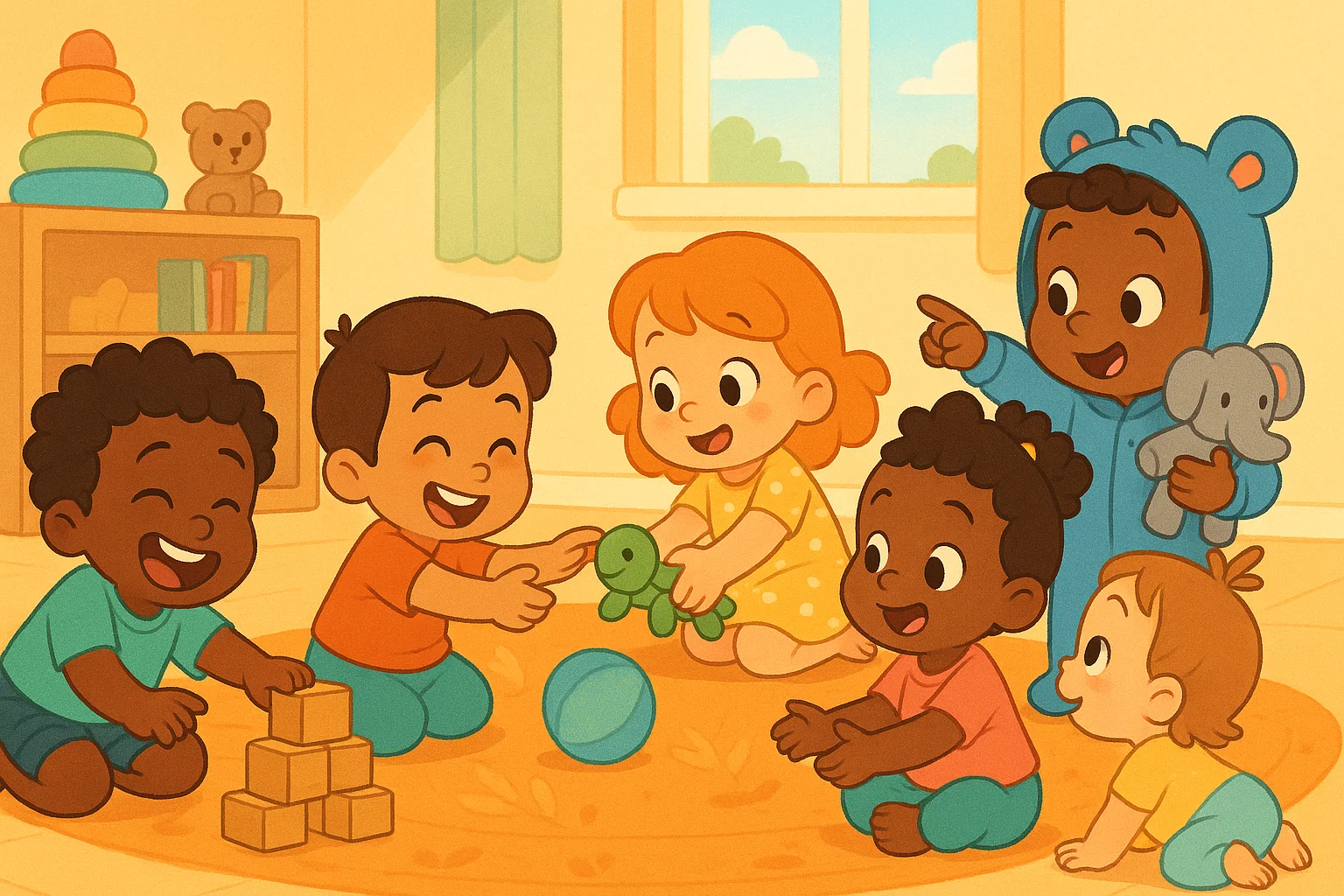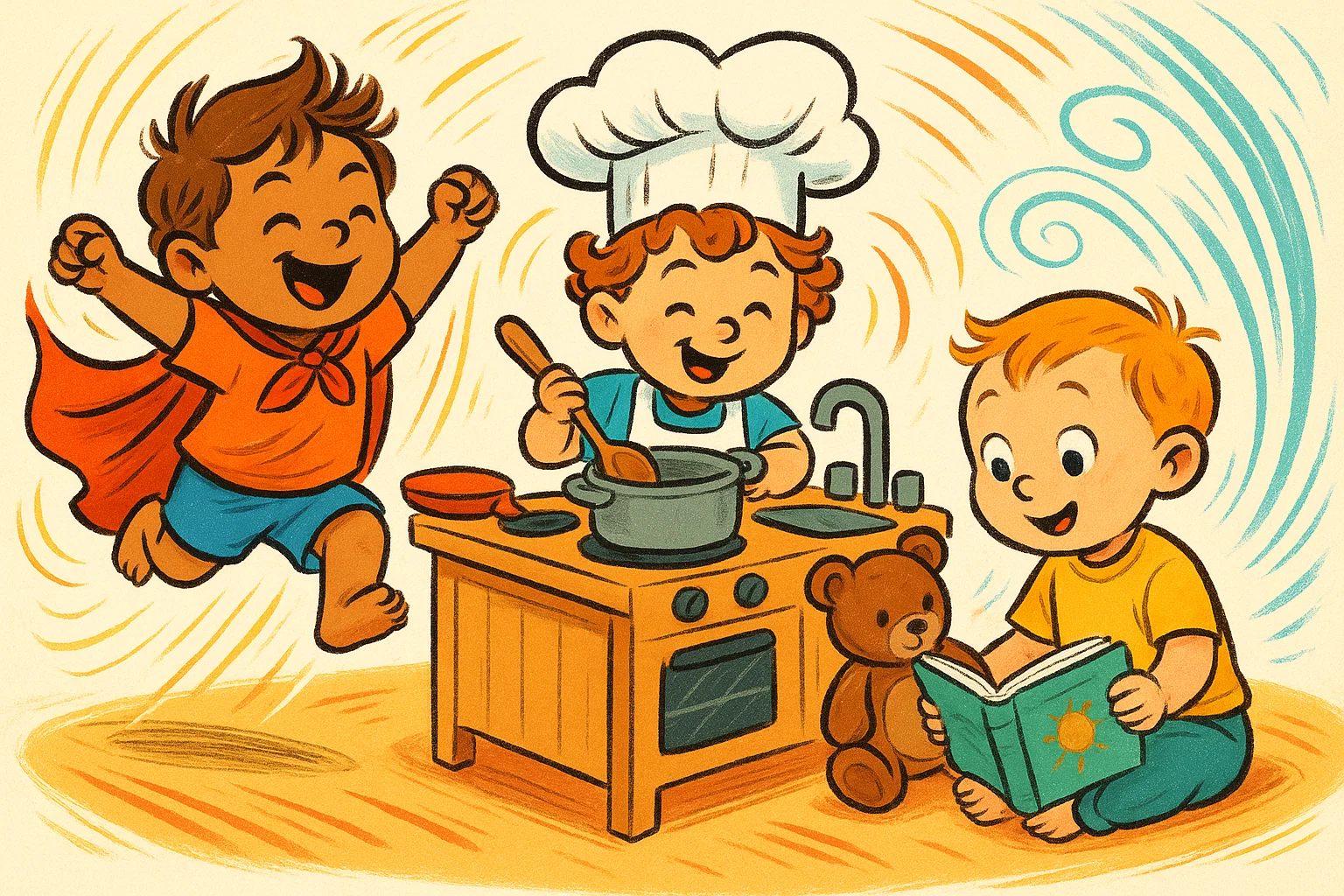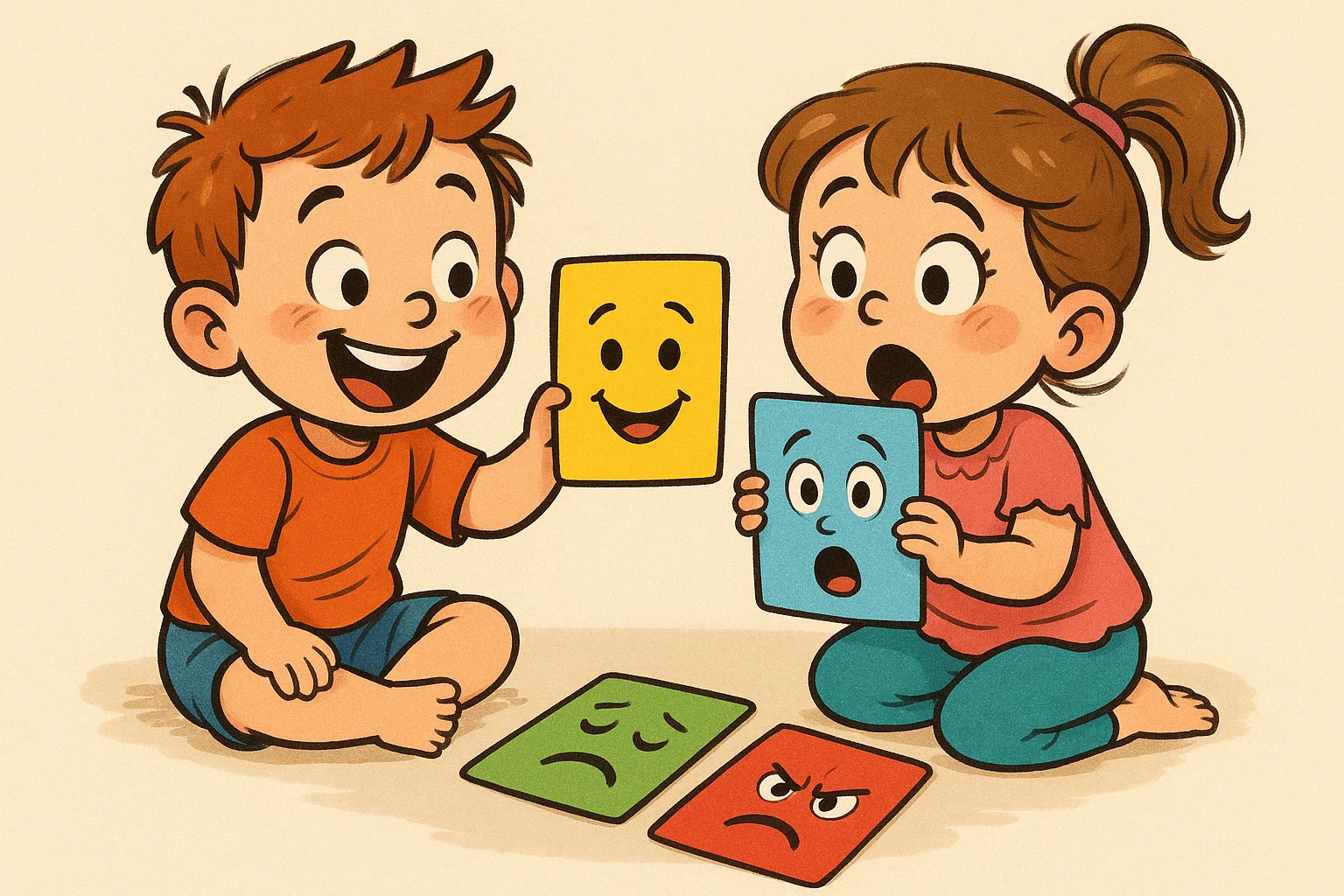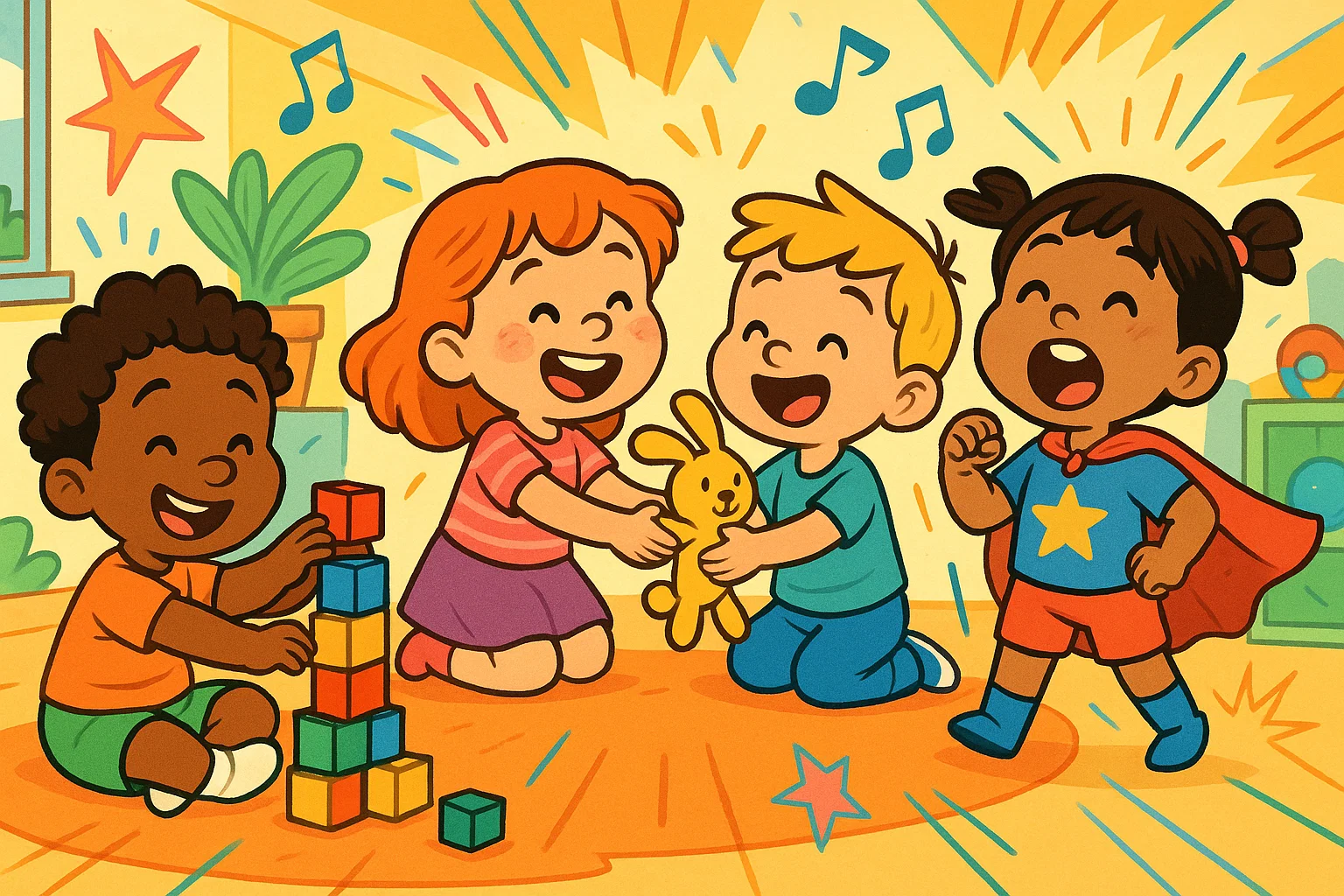Building strong social skills during the toddler years creates a foundation for lifelong success in relationships and communication. This comprehensive guide provides parents and caregivers with practical activities to help toddlers and preschoolers develop crucial social abilities through engaging, fun experiences.
Social skills development begins remarkably early – even before a child’s first birthday. By age 3 years, most toddlers can engage in back-and-forth conversations, show empathy, and participate in simple cooperative play. Understanding how to nurture these emerging abilities helps children learn to navigate social settings with confidence.
Social Skills Activities for Toddlers 🎯

Ready to get started? Here is a selection of time-tested activities and games that will help to develop your child’s social skills.
Games to encourage turn-taking
Turn-taking forms the cornerstone of successful social interaction. Simple games like rolling a ball back and forth teach toddlers the fundamental concept of waiting for their turn while maintaining engagement.
Effective turn-taking activities include:
- Building block towers together (one block per turn)
- Puzzle completion where each person places one piece
- Painting projects with shared brushes and colors
- Musical instruments passed between players
These games also help boost cognitive development by requiring toddlers to remember whose turn comes next.
Fun with pretend play
Pretend play serves as a powerful vehicle for social skills development. When toddlers engage in role-playing scenarios, they practice empathy by considering different perspectives and learn to communicate their ideas effectively.
Popular pretend play scenarios:
- Playing “house” with dolls or stuffed animals
- Setting up a pretend restaurant or store
- Acting out everyday routines like bedtime or grocery shopping
- Creating adventure stories with action figures
Playdates for social development
Structured playdates provide essential opportunities for toddlers to practice social skills with peers. These interactions help toddlers understand social cues, learn to share toys, and develop problem-solving abilities when conflicts arise.
Successful playdate strategies:
- Keep groups small (2-3 children maximum)
- Plan activities that require cooperation
- Have enough toys to minimize sharing conflicts initially
- Supervise interactions while allowing independence
Research from the University of Thessaly, Greece, shows that children who participate in regular playdates demonstrate significantly improved communication skills and emotional regulation compared to those with limited peer interaction.
Music and movement for skill development
Music and movement activities naturally encourage social interaction while developing coordination and listening skills. Group singing, dancing, and instrument playing create shared experiences that build connections between children.
Engaging music activities:
- Singing action songs with gestures
- Playing simple instruments in rhythm groups
- Dancing games that require partner cooperation
- Musical storytelling with sound effects
These activities help toddlers learn to listen to others, follow directions, and participate in group experiences – all crucial components of social competence.
Creative projects that build teamwork
Collaborative art projects teach toddlers to work together toward a common goal. These activities help children understand that different ideas can combine to create something beautiful.
| Project Type | Skills Developed | Age Suitability |
| Group painting | Sharing, cooperation | 18 months+ |
| Collage making | Turn-taking, creativity | 2 years+ |
| Building projects | Problem-solving, teamwork | 2.5 years+ |
| Garden planting | Responsibility, patience | 3 years+ |
Developing Social Skills Through Play

Beyond organized activities, the most natural way for children to learn is through play. Let’s explore how simple games can become a powerful tool for social development.
The importance of pretend play
Pretend play represents one of the most sophisticated forms of early learning. During these scenarios, toddlers learn to negotiate roles, express emotions appropriately, and understand cause-and-effect relationships in social contexts.
Children engaged in regular pretend play show enhanced language skills, with vocabulary development increasing by approximately 25% compared to peers with limited imaginative play opportunities. This type of play also stimulates imagination and creativity while providing a natural context for learning social rules.
Storytelling and discussions
Interactive storytelling sessions help toddlers develop listening skills and learn to express their thoughts coherently. When you tell stories together, toddlers practice taking turns speaking and learn to build on others’ ideas.
Effective storytelling techniques:
- Use picture books as conversation starters
- Encourage children to predict story outcomes
- Ask open-ended questions about characters’ feelings
- Create stories together, with each person adding details
Simple games like ‘Simon Says’
Classic games like Simon Says teach children to listen carefully, follow directions, and understand the difference between appropriate and inappropriate responses. These games also help develop impulse control and attention skills.
The game’s structure naturally incorporates turn-taking when children become “Simon,” giving them practice in leadership roles and clear communication.
Group games for skill development
Organized group activities help toddlers practice essential social skills in structured environments. Games like “Red Light, Green Light” teach impulse control, while cooperative games encourage teamwork and mutual support.
Benefits of group games:
- Improved listening skills
- Enhanced cooperation abilities
- Better emotional regulation
- Stronger peer relationships
Yoga and music classes
Structured classes provide excellent opportunities for toddlers to interact with others and develop essential social skills. Yoga classes teach toddlers to be aware of personal space while working as part of a group, while music classes encourage listening and responding to others.
Research posted on BMC Psychology indicates that children participating in regular group classes show improved social competence and reduced anxiety in new social situations.
Fostering Social Development Through Daily Routine 📅
Social learning isn’t limited to playtime. Everyday tasks offer a wealth of opportunities to practice important skills if you know how to use them.
Daily tasks as a social skill development opportunity
Everyday activities offer countless opportunities to practice social skills. Involving your little one in household tasks teaches cooperation, following directions, and contributing to family life.
Social learning through daily tasks:
- Setting the table together (teaches helping and responsibility)
- Grocery shopping (practices greetings and social courtesy)
- Cooking projects (encourages following directions and teamwork)
- Cleaning up (develops cooperation and shared responsibility)
Routines that encourage interaction
Consistent routines create predictable social interactions that help toddlers feel secure while practicing communication skills. Meal times, bedtime routines, and morning preparations all provide natural conversation opportunities.
During these routine interactions, children learn the rhythm of conversation, including when to speak, when to listen, and how to express needs appropriately.
Using songs and stories in a daily routine
Incorporating songs and stories into daily routines makes ordinary activities more engaging while providing language learning opportunities. Singing while getting dressed or telling stories during bath time creates positive associations with daily tasks.
These practices help children understand that social interaction can enhance any activity, building positive attitudes toward communication and cooperation.
The role of eye contact in social skills
Eye contact serves as a fundamental component of effective communication. Teaching toddlers to make appropriate eye contact helps them connect with others and understand social cues more effectively.
Strategies for encouraging eye contact:
- Get down to the child’s eye level during conversations
- Use engaging facial expressions during interactions
- Play games that naturally encourage looking at each other
- Model appropriate eye contact in your own interactions
Games to Understand Emotion

Before learning to interact with others, a child must understand their own feelings and emotions. These games will help toddlers explore and name what they’re feeling.
Emotion identification games
Learning to recognize and name emotions forms the basis of emotional intelligence. Simple games that involve identifying feelings in pictures, stories, or real situations help toddlers develop this crucial skill.
Effective emotion games:
- Feeling faces matching games
- Acting out different emotions
- Discussing characters’ feelings in books
- Using mirrors to practice facial expressions
Research made by Kaitlin Marie M. Opingo shows that children who regularly practice emotion identification demonstrate 30% better emotional regulation and empathy skills.
Pretend play with different emotions
Role-playing various emotional scenarios helps children understand that feelings are normal and manageable. Through pretend play, toddlers learn appropriate ways to express different emotions and develop empathy for others’ experiences.
Activities to discuss feelings
Creating regular opportunities to talk about emotions helps normalize emotional expression and teaches toddlers that feelings are important information about their experiences.
Discussion strategies:
- Ask about feelings during daily activities
- Share your own emotions appropriately
- Read books that explore different feelings
- Use emotion words frequently in conversation
Using visuals to understand emotion
Visual aids like emotion charts, picture books, and feeling cards help toddlers connect abstract emotional concepts with concrete images. These tools make emotion learning more accessible for young children who are still developing language skills.
Practical Exercises for Skill Development 🎈
Learning the theory is one thing, but practice is another. Here, we’ve gathered simple but effective exercises that can be easily incorporated into daily life.
Practicing eye contact
Eye contact skills develop gradually through consistent practice and positive reinforcement. Games that naturally encourage looking at each other help children become comfortable with this important social skill.
Eye contact activities:
- Peek-a-boo variations
- Singing songs with hand motions
- Playing “I Spy” games
- Having conversations during snack time
Games where they must take turns
Turn-taking games teach patience, impulse control, and fairness – essential components of social competence. These activities help children understand that waiting can lead to enjoyable experiences.
Turn-taking game examples:
- Board games adapted for toddlers
- Building projects with limited materials
- Cooking activities with shared utensils
- Art projects with rotating supplies
Simple activities to build social skills
Everyday interactions provide the most authentic opportunities for social skills practice. Simple activities like greeting neighbors, thanking store clerks, or playing with siblings naturally teach social conventions.
These real-world experiences help children understand that social skills have practical applications and make daily life more pleasant for everyone involved.
The ‘Simon Says’ game
Simon Says remains one of the most effective games for teaching listening skills, impulse control, and following directions. The game’s simple structure makes it accessible to toddlers while providing valuable social learning opportunities.
Educational benefits:
- Improves listening and attention skills
- Teaches the concept of authority and rules
- Develops impulse control and patience
- Provides leadership opportunities when toddlers take turns being “Simon”
Team games
Cooperative games where children work together toward shared goals teach valuable lessons about teamwork and mutual support. These activities help children understand that everyone’s contribution matters for group success.
Team game examples:
- Building structures together
- Creating group art projects
- Playing cooperative movement games
- Solving simple puzzles as a team
The National Association for the Education of Young Children emphasizes that cooperative play experiences significantly improve children’s ability to work effectively with others throughout their lives.


